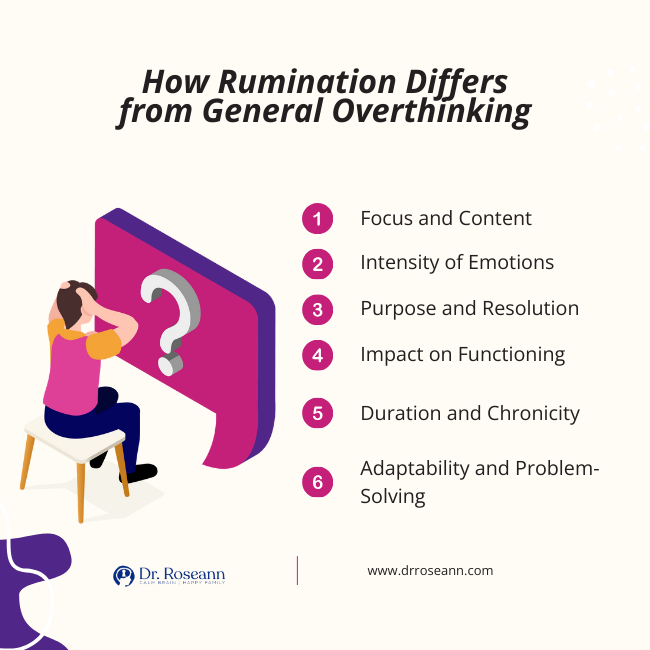Obsessive-Compulsive Disorder (OCD) is a mental health condition characterized by unwanted intrusive thoughts and repetitive behaviors. These thoughts, often referred to as obsessive thoughts, can lead individuals to perform specific actions or mental rituals, known as compulsive behaviors, as a way to cope with the distress caused by the obsessions. Within this spectrum, one notable subtype of OCD is Rumination OCD, characterized by a persistent and distressing cycle of repetitive negative thinking.
Rumination in OCD involves a relentless pattern of repetitive negative thoughts, creating a complex mental landscape for individuals, including children and teens. Unlike general overthinking, rumination is marked by its pervasive and distressing nature, often leading to significant distress and impacting the quality of life.
Rumination, within the context of OCD, refers to the obsessive and compulsive cycle of repetitive negative thinking (Raines et al., 2017). This vicious cycle can be triggered by specific fears, past traumatic experiences, or apprehensions about future events. Characteristics of rumination include the inability to control these persistent thoughts, leading to heightened feelings of anxiety and distress.
How Rumination Differs from General Overthinking

Rumination and general overthinking share some similarities, but they differ in terms of their focus, intensity, and impact on mental well-being. Here are the key distinctions between OCD rumination and general overthinking:
1. Focus and Content
Rumination: In psychological terms, rumination often refers to repetitive and intrusive thoughts that revolve around negative emotions, past events, or potential future problems. Rumination tends to be more specific, with the unwanted thoughts frequently centered on themes like past mistakes, regrets, guilt, or fears.
General Overthinking: Overthinking, in a broader sense, can involve repetitive thoughts about a wide range of topics, including everyday decisions, upcoming events, or various aspects of one’s daily life. It may not necessarily be focused on negative emotions or specific themes.
2. Intensity of Emotions
Rumination: Often involves intense and distressing emotions, such as anxiety, guilt, or sadness. The emotional content of rumination tends to be strong and may be linked to a particular event or theme.
General Overthinking: While overthinking can also lead to heightened stress and anxiety, the emotions involved may not be as consistently intense or focused on a specific theme.
3. Purpose and Resolution
Rumination: People ruminate as a way to try to make sense of past events, prevent future mistakes, or gain control over their ruminative thoughts and emotions. However, it often leads to a cycle of unproductive, repetitive thinking without resolution.
General Overthinking: Overthinking may occur without a clear purpose or goal. It can be a habitual way of processing information or making decisions, but it may not be driven by a specific need for resolution.
4. Impact on Functioning
Rumination: Tends to have a more pronounced impact on daily functioning, as it can interfere with concentration, decision-making, and overall well-being. Rumination is often associated with conditions like depressive symptoms and anxiety disorders.
General Overthinking: While excessive overthinking can cause stress and hinder decision-making, it may not necessarily reach the level of interference seen in rumination-related disorders.
5. Duration and Chronicity
Rumination: It can be chronic and persistent, with thoughts recurring over an extended period. It may become a habitual way of responding to stressors and challenges.
General Overthinking: While overthinking can be persistent, it may not be as deeply ingrained or chronic as rumination. It may occur episodically in response to specific situations.
6. Adaptability and Problem-Solving
Rumination: Rumination syndrome often lacks adaptability and constructive problem-solving. Individuals may get stuck in repetitive thought patterns without finding effective solutions.
General Overthinking: It may involve attempts at problem-solving, but the overthinking process may be less structured and effective in reaching resolutions.
The Cycle of Compulsive Rumination in OCD
How do you teach your child to stop ruminating? Compulsive rumination is when individuals engage in repetitive thinking about a particular topic. Breaking the cycle of these mental compulsions is crucial for managing OCD symptoms effectively.
Cognitive behavioral therapy (CBT), along with Exposure Response Prevention (ERP) therapy, with its emphasis on breaking negative thought patterns and behavioral cycles, plays a pivotal role in addressing compulsive rumination (Motivala et al., 2017).
It helps one focus on the present moment by employing techniques such as mindfulness meditation and deep breathing. With cognitive-behavioral therapy, your child can gain better control over their thought process.
The parents of kids experiencing distressing thoughts and compulsive behaviors should seek help from a mental health professional. Recognizing the symptoms of distress and understanding the negative impact on daily life is the first step toward getting effective treatments.
A licensed therapist, especially one specializing in OCD, can provide tailored treatment plans. Their treatment options often include a combination of cognitive-behavioral therapy, medication, such as selective serotonin reuptake inhibitors, and other therapeutic approaches.
However, medications should never be the first line of OCD treatment for children. Many science-backed natural solutions can produce the same, if not better, results. The BrainBehaviorResetTM Program incorporates neurofeedback (Hammond, 2003), PEMF therapy, and magnesium supplements in the child’s treatment plan.
OCD often coexists with other anxiety disorders, such as generalized anxiety disorder and panic disorder. Understanding the nature of these related disorders is crucial for comprehensive treatment and addressing the common symptom of excessive, repetitive thinking.
The continuous loop of rumination not only affects children with obsessive compulsive disorder but is also a common experience in related disorders. Breaking this loop requires a multifaceted approach, therapeutic interventions, and lifestyle changes. Parents should learn that treating rumination in kids the natural way is possible.
Parent Action Steps
☐ Learn more about OCD by listening to my It’s Gonna Be OK! Podcast and the OCD series.
☐Understand the main distinction between obsessive rumination and general overthinking.
☐ Explore natural solutions with OCD specialists and consider non-pharmacological interventions.
☐ Acknowledge the potential coexistence of OCD with the symptoms of depression and anxiety disorders.
☐ Encourage spending time on healthy habits, stress-reducing activities, and a balanced routine.
☐ Take the OCD Quiz to help your child with symptoms.
☐ Use the Solutions Matcher to get personalized treatment of OCD symptoms for your child.
Citations
Hammond, D. C. (2003). QEEG-Guided Neurofeedback in the Treatment of Obsessive Compulsive Disorder. Journal of Neurotherapy, 7(2), 25–52. https://doi.org/10.1300/j184v07n02_03
Motivala, S. J., Arellano, M., Greco, R. L., Aitken, D., Hutcheson, N., Tadayonnejad, R., O’Neill, J., & Feusner, J. D. (2017). Relationships between obsessive-compulsive disorder, depression and functioning before and after exposure and response prevention therapy. International Journal of Psychiatry in Clinical Practice, 22(1), 40–46. https://doi.org/10.1080/13651501.2017.1351991
Raines, A. M., Vidaurri, D. N., Portero, A. K., & Schmidt, N. B. (2017). Associations between rumination and obsessive-compulsive symptom dimensions. Personality and Individual Differences, 113, 63–67. https://doi.org/10.1016/j.paid.2017.03.001
Dr. Roseann is a mental health expert who frequently is in the media:
- Insider: What is OCD?
- What to Expect: Why Does My Toddler Keep Pulling Her Own Hair?
- Parade: Why Does My Toddler Keep Pulling Her Own Hair?
- Single Care Controlling the uncontrollable: Living with OCD during a pandemic
- MomsCove How to Help a Child with Anxiety and OCD
- Holistic Counseling Podcast: Effective Treatments for OCD
- Epidemic Answers: Neurofeedback for ADHD, anxiety, OCD and mood
- Cai Grahm: Is it anxiety or OCD?
- BCIA: Calming the OCD Brain with Neurofeedback and ERP Therapy
- Hope for Anxiety and OCD: Sudden Onset OCD
- Integrative Practitioner: Integrative Approaches to Treating OCD
- HappiHuman: Is it an Eating Disorder or OCD
Are you looking for SOLUTIONS for your struggling child or teen?
Dr. Roseann and her team are all about science-backed solutions, so you are in the right place!
Grab your complimentary copy of
147 Therapist-Endorsed Self-Regulation Strategies for Children: A Practical Guide for Parents
You can get her books for parents and professionals, including: It’s Gonna Be OK™: Proven Ways to Improve Your Child’s Mental Health, Teletherapy Toolkit™ and Brain Under Attack: A Resource For Parents and Caregivers of Children With PANS, PANDAS, and Autoimmune Encephalopathy.
If you are a business or organization that needs proactive guidance to support employee mental health or an organization looking for a brand representative, check out Dr. Roseann’s professional speaking page to see how we can work together.
Dr. Roseann is a Children’s Mental Health Expert and Licensed Therapist who has been featured in/on hundreds of media outlets including The Mel Robbins Show, CBS, NBC, PIX11 NYC, Today, FORBES, CNN, The New York Times, The Washington Post, Business Insider, Women’s Day, Healthline, CNET, Parade Magazine and PARENTS. FORBES called her, “A thought leader in children’s mental health.”

She coined the terms, “Re-entry panic syndrome” and “eco-anxiety” and is a frequent contributor to media on mental health.
Dr. Roseann Capanna-Hodge has three decades of experience in working with children, teens and their families with attention-deficit hyperactivity disorder (ADHD), autism, concussion, dyslexia and learning disability, anxiety, Obsessive Compulsive Disorder (OCD), depression and mood disorder, Lyme Disease, and PANS/PANDAS using science-backed natural mental health solutions such as supplements, magnesium, nutrition, QEEG Brain maps, neurofeedback, PEMF, psychotherapy and other non-medication approaches.
She is the author of three bestselling books, It’s Gonna Be OK!: Proven Ways to Improve Your Child's Mental Health, The Teletherapy Toolkit, and Brain Under Attack. Dr. Roseann is known for offering a message of hope through science-endorsed methods that promote a calm brain.
Her trademarked BrainBehaviorResetⓇ Program and It’s Gonna be OK!Ⓡ Podcast has been a cornerstone for thousands of parents facing mental health, behavioral or neurodevelopmental challenges.
She is the founder and director of The Global Institute of Children’s Mental Health, Neurotastic™Brain Formulas and Dr. Roseann Capanna-Hodge, LLC. Dr. Roseann is a Board Certified Neurofeedback (BCN) Practitioner, a Board Member of the Northeast Region Biofeedback Society (NRBS), Certified Integrative Mental Health Professional (CIMHP) and an Amen Clinic Certified Brain Health Coach. She is also a member of The International Lyme Disease and Associated Disease Society (ILADS), The American Psychological Association (APA), Anxiety and Depression Association of America (ADAA) National Association of School Psychologists (NASP), International OCD Foundation (IOCDF).
© Roseann-Capanna-Hodge, LLC 2023










